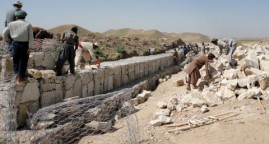Interview with Pedro Medrano Rojas, UN Senior Coordinator for the Cholera Response in Haiti
03/04/2015. Despite severe infrastructure and financial constraints, concerted efforts by Haiti and its partners succeeded in drastically reducing the number of reported cholera cases in the country – down from a peak of over 350,000 reported cases for 2011, to around 28,000 reported cases for 2014
The persistence of cholera in Haiti is mainly due to the lack of access to clean water and appropriate sanitation facilities, and although considerable improvements have been made in this regard, the small Caribbean nation continues to host the largest cholera epidemic in the Western Hemisphere. To date, the epidemic has affected some 725,600 people and claimed over 8,800 lives in Haiti since October 2010.
… And I think that what we are facing now is, as I said before, this perception that because of the progress that has been made, there is no longer an emergency there… and also the other crises around the world. Also, the fact that this is not prominent in the major media, it is not perceived as an emergency. I think that is the purpose of our work. That’s the reason why I am reaching out to partners, Member States, not to forget Haiti. Otherwise, we will continue to have not only the surge we have just mentioned but an increasing number of people affected and also fatalities – that can be avoided, by the way.
Read the interview on the United nation website
Related Articles
Major New Disaster Risk Management Program for Afghanistan
10/03/2015. The 36-month, USD 9.9 million project will build upon IOM’s ongoing efforts to reduce the risks posed by natural disasters in Afghanistan.
Extreme weather hit 60 million people in 2018, no part of the world spared
01/24/2019. The study showed that earthquakes and tsunamis claimed more lives than any other type of hazard.
Lebanon’s storm preparedness helps response plan
03/02/2015. A decade of efforts to better prepare and respond to disasters was highlighted when seasonal storm “Zina” struck Lebanon in early January 2015.






